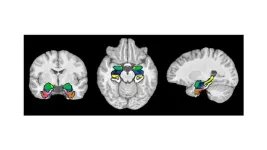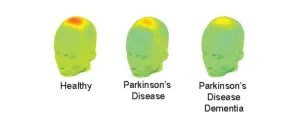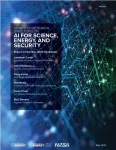(Press-News.org) BOSTON – A new study led by investigators from Massachusetts General Hospital, a founding member of the Mass General Brigham healthcare system, offers an explanation for why light-to-moderate alcohol consumption may be associated with lower risk of heart disease. For the first time, researchers found that alcohol, in light to moderate quantities, was associated with long-term reductions in stress signaling in the brain. This impact on the brain’s stress systems appeared to significantly account for the reductions in cardiovascular events seen in light to moderate drinkers participating in the study. Findings are published in the Journal of the American College of Cardiology
“We are not advocating the use of alcohol to reduce the risk of heart attacks or strokes because of other concerning effects of alcohol on health,” says senior author and cardiologist Ahmed Tawakol, MD, co-director of the Cardiovascular Imaging Research Center at Massachusetts General Hospital. “We wanted to understand how light to moderate drinking reduces cardiovascular disease, as demonstrated by multiple other studies. And if we could find the mechanism, the goal would be to find other approaches that could replicate or induce alcohol’s protective cardiac effects without the adverse impacts of alcohol.”
Previous epidemiological studies have suggested that light to moderate alcohol consumption (1 drink per day for women and 1 to 2 drinks per day for men) is associated with a lower risk of cardiovascular disease. But it was unknown whether alcohol was inducing cardiovascular benefits, or whether light/moderate drinkers’ health behaviors, socioeconomic status, or other factors protected their hearts.
The study, led by K Mezue and M Osborne, included more than 50,000 individuals enrolled in the Mass General Brigham Biobank. The first part of the study evaluated the relationship between light/moderate alcohol consumption and major adverse cardiovascular events after adjusting for a range of genetic, clinical, lifestyle, and socioeconomic confounders. The researchers found that light/moderate alcohol consumption was associated with a substantial reduction in the risk of cardiovascular disease events, even after accounting for those other factors.
Next, they studied a subset of 754 individuals who had undergone previous PET/CT brain imaging (primarily for cancer surveillance) to determine the effect of light/moderate alcohol consumption on resting stress-related neural network activity.
The brain imaging showed reduced stress signaling in the amygdala, the brain region associated with stress responses, in individuals who were light to moderate drinkers compared to those who abstained from alcohol or who drank little. And when the investigators looked at these individuals’ history of cardiovascular events, they found fewer heart attacks and strokes in light to moderate drinkers. “We found that the brain changes in light to moderate drinkers explained a significant portion of the protective cardiac effects,” says Tawakol.
It’s long been known that alcohol reduces the amygdala’s reactivity to threatening stimuli while individuals are drinking. The current study is the first to indicate that light to moderate alcohol consumption has longer-term neurobiological effects in dampening activity in the amygdala, which may have a significant downstream impact on the cardiovascular system.
“When the amygdala is too alert and vigilant, the sympathetic nervous system is heightened, which drives up blood pressure and increases heart rate, and triggers the release of inflammatory cells,” explains Tawakol. “If the stress is chronic, the result is hypertension, increased inflammation, and a substantial risk of obesity, diabetes, and cardiovascular disease.”
Finally, the investigators examined whether light/moderate alcohol would be even more effective at reducing heart attacks and strokes in people who are prone to a chronically higher stress response, such as those with a history of significant anxiety. They found that, within the 50,000-patient sample, light to moderate drinking was associated with nearly double the cardiac-protective effect in individuals with a history of anxiety compared with others.
Yet while light/moderate drinkers lowered their risk for cardiovascular disease, the study also showed that any amount of alcohol increases the risk of cancer. And at higher amounts of alcohol consumption--more than 14 drinks a week--heart attack risk started to increase while overall brain activity started to decrease (which may be associated with adverse cognitive health).
The authors concluded that research should focus on finding new interventions that reduce the brain’s stress activity without the deleterious effects of alcohol. The research team is currently studying the effect of exercise, stress-reduction interventions such as meditation, and pharmacological therapies on stress-associated neural networks and how they might induce cardiovascular benefits.
Co-authors include Kenechukwu Mezue and Michael T. Osborne.
This study was supported by the National Institutes of Health.
About the Massachusetts General Hospital
Massachusetts General Hospital, founded in 1811, is the original and largest teaching hospital of Harvard Medical School. The Mass General Research Institute conducts the largest hospital-based research program in the nation, with annual research operations of more than $1 billion and comprises more than 9,500 researchers working across more than 30 institutes, centers and departments. In July 2022, Mass General was named #8 in the U.S. News & World Report list of "America’s Best Hospitals." MGH is a founding member of the Mass General Brigham healthcare system.
END
Mass General Hospital researchers uncover why light-to-moderate drinking is tied to better heart health
The findings could help in identifying new interventions that reduce the brain’s stress activity without the negative health effects of alcohol
2023-06-12
ELSE PRESS RELEASES FROM THIS DATE:
NIH grant backs study focused on Alzheimer’s in women
2023-06-12
HOUSTON – (June 12, 2023) – Two-thirds of the people suffering from Alzheimer’s disease are women, yet most research has ignored differences between the sexes.
To help fill this gap, Rice University postdoctoral fellow Hannah Ballard will look at how Alzheimer’s risk, estrogen levels and menopausal status interact with memory-related brain function and behavioral outcomes in women age 35-80.
Supported by a three-year grant from the National Institutes of Health (NIH), Ballard’s research could help identify the physiological factors ...
Self-esteem of kids with short stature tied to social supports, not height
2023-06-12
Philadelphia, June 12, 2023—Challenging the assumption that short stature negatively impacts children and adolescents’ self-esteem, a new study by researchers at Children’s Hospital of Philadelphia (CHOP) has found that in otherwise healthy short youth, quality of life and self-esteem are associated with coping skills and how supported they feel and not the degree of their short stature. The findings were published in The Journal of Pediatrics.
“There is a notion among some parents and caregivers that short stature will negatively impact their children in terms of self-esteem and social adjustment, so they seek out growth hormone ...
Brain waves may predict cognitive impairment in Parkinson's disease
2023-06-12
A few minutes of data recorded from a single electrode placed on top of the head may be sufficient to predict thinking problems, including dementia, in patients with Parkinson’s disease (PD). The finding from a new University of Iowa study might help improve diagnosis of cognitive disability in PD and develop new biomarkers and targeted therapies for cognitive symptoms of the disease.
“Cognitive decline, including dementia, is a significant and underappreciated symptom of Parkinson’s disease. ...
The Face Game: A citizen science project to learn how Artificial Intelligence will choose to appear to humans
2023-06-12
Online, profile pictures of human faces are everywhere, and they play a crucial role in shaping the first impression we make on others. Right now, AI gives people the digital tools to transform their online appearance in any way they desire, often making themselves look younger or more attractive. But this is just the beginning: AI is not only helping us play this face game amongst ourselves, but it is also learning the game from us and quietly deciding which face it will showcase as itself when interacting with us.
To better understand these mechanisms, researchers from the Max Planck ...
Ethics & Human Research, May-June 2023
2023-06-12
Making an Advance Research Directive: An Interview Study with Adults Aged 55 and Older with Interests in Dementia Research
Nola M. Ries, Briony Johnston
Many people with dementia are interested in taking part in research, including when they no longer have capacity to provide informed consent. Advance research directives (ARD) enable people to document their wishes about research participation prior to becoming decisionally incapacitated. However, there are few available ARD resources. This Australian interview study elicited the views of people aged 55 years and older about the content of an ...
Visionary report unveils ambitious roadmap to harness the power of AI in scientific discovery
2023-06-12
Innovations in artificial intelligence (AI) are rapidly shaping our world, from virtual assistants and chatbots to self-driving cars and automated manufacturing. Seizing on the potential of AI to transform science, the nation’s leading experts in science and technology have released a blueprint for the United States to accelerate progress by expanding its capabilities in AI and big data analysis.
“AI for Science, Energy, and Security” lays out a comprehensive vision ...
Masai giraffes more endangered than previously thought
2023-06-12
UNIVERSITY PARK, Pa. — Giraffes in eastern Africa may be even more endangered than previously thought. A new study led by researchers at Penn State reveals that populations of Masai giraffes separated geographically by the Great Rift Valley have not interbred — or exchanged genetic material — in more than a thousand years, and in some cases hundreds of thousands of years. The researchers recommend that the two populations be considered separately for conservation purposes, with separate but coordinated conservation efforts to manage each population.
Populations of giraffes have declined rapidly in the last thirty years, with ...
WVU research shows how much pharmaceutical companies are capitalizing on rare drug incentives
2023-06-12
Drugs used to treat rare conditions are earning pharmaceutical companies almost as much as those marketed to the general public, according to a researcher at West Virginia University. Sean Tu, a College of Law professor found lucrative so-called “orphan” drugs earn manufacturing tax credits, have longer patent exclusivities and face easier Food and Drug Administration review.
Orphan drugs treat diseases that affect fewer than 200,000 Americans. In addition to tax credits, Congress has incentivized the pharmaceutical companies that manufacture orphan drugs with a waiver of ...
Planet orbiting 2 stars discovered using new technique
2023-06-12
COLUMBUS, Ohio – An international team of astronomers is the first to apply an old technique to discover a new type of planet that orbits two stars – what is known as a circumbinary planet.
As an added bonus, researchers found a second planet that is orbiting the same two stars, which is only the second confirmed multi-planet circumbinary system found to date. The study was published today in the journal Nature Astronomy.
Circumbinary planets were once relegated to only science fiction, but thanks to data collected from NASA’s Kepler mission, astronomers now know that multiple star systems are ...
Railways could be a key 'utility player' for backup power
2023-06-12
– By Christina Nunez
The U.S. electric grid faces simultaneous, evolving pressures. Demand for power from the grid is increasing as people adopt electric cars and building energy is transitioned from gas to electricity. At the same time, climate change is driving more extreme weather. Events like the 2020 heat wave that led to rolling blackouts in California are relatively infrequent, but they are happening more often – and utilities need to be ready for them.
New research points to a flexible, cost-effective option for backup power when trouble strikes: batteries aboard trains. A study from the U.S. Department of Energy’s Lawrence Berkeley National Laboratory ...
LAST 30 PRESS RELEASES:
Bug beats: caterpillars use complex rhythms to communicate with ants
High-risk patients account for 80% of post-surgery deaths
Celebrity dolphin of Venice doesn’t need special protection – except from humans
Tulane study reveals key differences in long-term brain effects of COVID-19 and flu
The long standing commercialization challenge of lithium batteries, often called the dream battery, has been solved.
New method to remove toxic PFAS chemicals from water
The nanozymes hypothesis of the origin of life (on Earth) proposed
Microalgae-derived biochar enables fast, low-cost detection of hydrogen peroxide
Researchers highlight promise of biochar composites for sustainable 3D printing
Machine learning helps design low-cost biochar to fight phosphorus pollution in lakes
Urine tests confirm alcohol consumption in wild African chimpanzees
Barshop Institute to receive up to $38 million from ARPA-H, anchoring UT San Antonio as a national leader in aging and healthy longevity science
Anion-cation synergistic additives solve the "performance triangle" problem in zinc-iodine batteries
Ancient diets reveal surprising survival strategies in prehistoric Poland
Pre-pregnancy parental overweight/obesity linked to next generation’s heightened fatty liver disease risk
Obstructive sleep apnoea may cost UK + US economies billions in lost productivity
Guidelines set new playbook for pediatric clinical trial reporting
Adolescent cannabis use may follow the same pattern as alcohol use
Lifespan-extending treatments increase variation in age at time of death
From ancient myths to ‘Indo-manga’: Artists in the Global South are reframing the comic
Putting some ‘muscle’ into material design
House fires release harmful compounds into the air
Novel structural insights into Phytophthora effectors challenge long-held assumptions in plant pathology
Q&A: Researchers discuss potential solutions for the feedback loop affecting scientific publishing
A new ecological model highlights how fluctuating environments push microbes to work together
Chapman University researcher warns of structural risks at Grand Renaissance Dam putting property and lives in danger
Courtship is complicated, even in fruit flies
Columbia announces ARPA-H contract to advance science of healthy aging
New NYUAD study reveals hidden stress facing coral reef fish in the Arabian Gulf
36 months later: Distance learning in the wake of COVID-19
[Press-News.org] Mass General Hospital researchers uncover why light-to-moderate drinking is tied to better heart healthThe findings could help in identifying new interventions that reduce the brain’s stress activity without the negative health effects of alcohol





